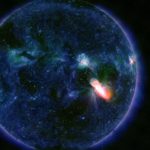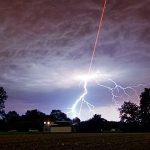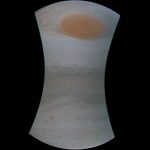STRONG SOLAR FLARE AND CME0
- From Around the Web, Space
- July 14, 2017
After days of suspenseful quiet, huge sunspot AR2665 finally erupted on July 14th (0209 UT), producing a powerful and long-lasting M2-class solar flare.

After days of suspenseful quiet, huge sunspot AR2665 finally erupted on July 14th (0209 UT), producing a powerful and long-lasting M2-class solar flare.

There was a strange object flying over Toronto that caught the light, catching the attention of a couple celebrating Canada Day.

At the University Sapienza in Rome, a team of researchers from the Physics Department and the Institute for Nanotechnology of the CNR, lead by physics professor Roberto Di Leonardo, has shown that genetically modified bacteria, expressing the protein proteorhodhopsin, can be used as tiny propellers in micromachines that are invisible to the human eye and whose speed can be reliably and continuously tuned by shining green light of controlled intensity.

In a world-first, China has succeeded in using quantum entanglement to send data to a satellite.

NASA is putting up the raw images of Jupiter’s red spot straight from the Juno Spacecraft.

Get amped to learn about lithium-ion energy storage!

On Tuesday, July 11th, a Canadian witness spotted this strange flying rectangle passing by their apartment complex.

An iceberg about the size of the state of Delaware split off from Antarctica’s Larsen C ice shelf sometime between July 10 and July 12.

Last year, the existence of an unknown planet in our Solar system was announced. However, this hypothesis was subsequently called into question as biases in the observational data were detected. Now astronomers have used a novel technique to analyze the orbits of the so-called extreme trans-Neptunian objects and, once again, they point out that there is something perturbing them: a planet located at a distance between 300 to 400 times the Earth-Sun separation.

Genome GIFs.